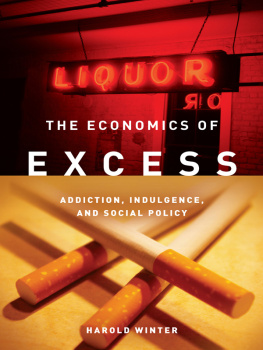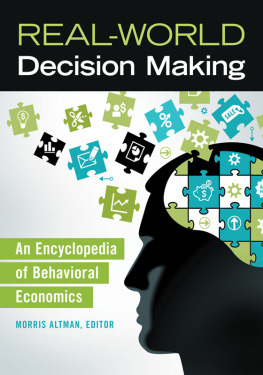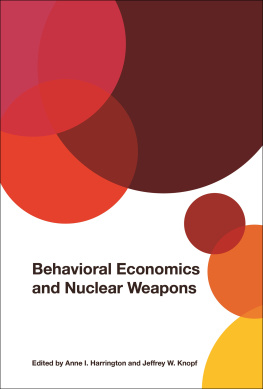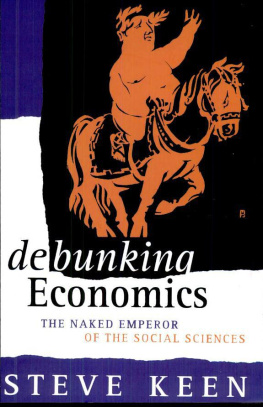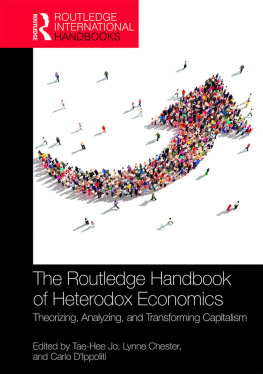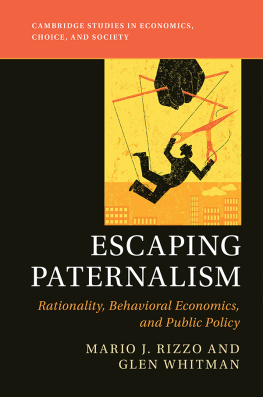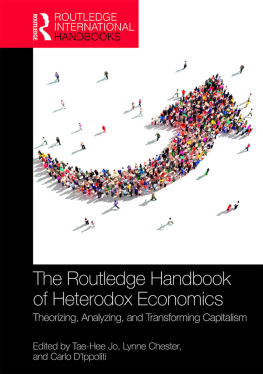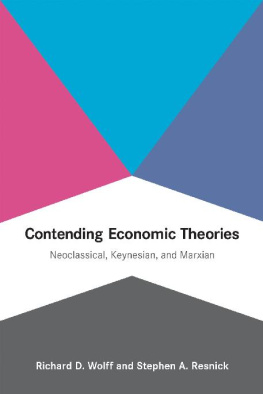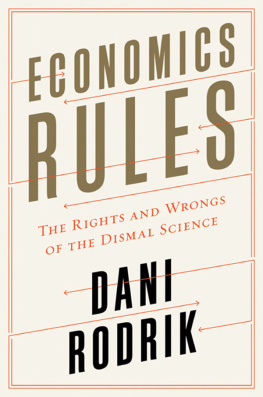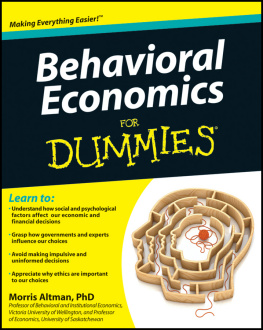Stanford University Press
Stanford, California
2011 by the Board of Trustees of the Leland Stanford Junior University. All rights reserved.
No part of this book may be reproduced or transmitted in any form or by any means, electronic or mechanical, including photocopying and recording, or in any information storage or retrieval system without the prior written permission of Stanford University Press.
Special discounts for bulk quantities of Stanford Economics and Finance are available to corporations, professional associations, and other organizations. For details and discount information, contact the special sales department of Stanford University Press. Tel: (650) 736-1782, Fax: (650) 736-1784
Printed in the United States of America on acid-free, archival-quality paper
Library of Congress Cataloging-in-Publication Data
Winter, Harold, 1960- author.
The economics of excess : addiction, indulgence, and social policy / Harold Winter.
pages cm
Includes bibliographical references and index.
ISBN 978-0-8047-6147-5 (cloth : alk. paper) ISBN 978-0-8047-6148-2 (pbk. : alk. paper)
1. Substance abuseEconomic aspects. 2. Substance abuseGovernment policy. 3. Social policyEconomic aspects. 4. EconomicsPsychological aspects. I. Title.
HV4998.W56 2011
362.29dc22
2011004557
Typeset by Newgen in 10/14 Minion
E-book ISBN: 978-0-8047-8067-4
TO THOMAS MICHAEL WINTER, FOR TEACHING ME THE TRUE MEANING OF PATERNALISM. I HOPE YOU ENJOY ALL YOUR FUTURE EXCESSES.
PREFACE
Do cigarette taxes make smokers happier? This unusual question comes from the title of the research paper (Gruber and Mullainathan, 2002) that started me on the journey of writing this book. I thought the authors were being sarcastic with their title, and the answer to their question would obviously be no. I was wrong. The idea that taxation makes smokers happier is at odds with the traditional economic model of consumption. A tax raises the final price a consumer must pay for a good, and a price increase is usually thought of as making a consumer worse off. Do you feel happier when there are price increases for the products you enjoy consuming? I had a very hard time wrapping my mind around the idea that smokers welcome increased taxation. To make matters worse, even if smokers dont welcome increased taxation, some economists argue that these smokers are better off having their behavior controlled even if they dont realize they are better off. Within this framework, it is not difficult to justify social policy designed to protect people from themselves.
Protecting people from themselves has traditionally not been much of a concern to economists. The more traditional justification for social control policies such as taxation is to protect people from others. Smokers harm not only themselves but others, with their secondhand smoke. Drinkers who drive while under the influence put others at risk. Adverse health outcomes caused by smoking, drinking, and overeating impose health insurance costs on others who belong to the same social or private insurance pool. Countless research papers and books have been written about the pros and cons of numerous social policy options designed to control behavior that is costly to others. This book, instead, focuses mainly on the more controversial justification (at least among economists) for social control policyto protect people from themselves.
A relatively new field of economics known as behavioral economics challenges the standard economic premise that people are fully rational. As briefly explained in the introduction of an important volume on the applications of behavioral economics to various fields of economics:
Over the last decade or so, behavioral economics has fundamentally changed the way economists conceptualize the world. Behavioral economics is an umbrella of approaches that seek to extend the standard economics framework to account for relevant features of human behavior that are absent in the standard economics framework. Typically, this calls for borrowing from the neighboring social sciences, particularly from psychology and sociology. The emphasis is on well-documented empirical findings: at the core of behavioral economics is the conviction that making our model of an economic man more accurate will improve our understanding of economics, thereby making the discipline more useful. (Diamond and Vartiainen, 2007, 1)
In essence, behavioral economics contends that people are far from perfect, and depending on the context, it is these imperfections that provide justifications for social policy to protect people from themselves.
In this book, I discuss both standard and behavioral economics applied to addiction, indulgence, and social policy. Although these issues are related, they can also be quite segmented according to how economists approach them. In , I provide a thorough discussion of economic models of addiction, both standard and behavioral. The model I develop in most detail takes into account both approaches. And even though this is the most challenging material in the book, it is highly instructive, especially for students. Fortunately, for the more casual reader, all the key concepts are developed in simpler examples so that when they are referred to later in the book they can easily be understood.
In the next three chapters, I examine specific indulgences: smoking (). The vast majority of economic research on these topics does not explicitly take into account models of addiction or behavioral economics, but the standard models still offer interesting insights into the ways economists approach these issues. Throughout these three chapters, I try not to present material that is overly redundant. It would be easy to write a specific section on smoking, and then in the next chapter use the same material and simply replace the word smoking with the word drinking. For example, in the smoking chapter I discuss how smokers perceive the health risks of smoking. The key material is on how economists approach risk misperception, and that can be applied to any type of risk. Once discussed in terms of smoking, it is not necessary to repeat all that material again. I try to keep these chapters reasonably separated and focused on unique issues. By necessity, there is some overlap, but not much. Thus, if you are familiar with this material and read just one of the chapters, you may feel that I have not been complete. My goal is to make the three chapters work as a whole and to complement each other, not to substitute for one another.
Social policy is the focus of , I briefly summarize some of the main points made throughout the book, and discuss the role of economic analysis in advising social policy.
The primary target audience for this book is undergraduate students with little or no background in economics, but the material may also be of interest to a broader audience. There are no mathematical equations, no graphs, and no tables and only a few numerical examples that facilitate the discussion when necessary. The goal is to make a large scholarly literature accessible to those who lack the training, or the time, to read the source material themselves. That being said, this book does not offer an extensive scholarly survey designed to aid researchers in the field. As much material as there is discussed here, far more is not addressed. A thorough list of references and comprehensive chapter-ending suggested readings aid the interested reader in delving further into the material.

